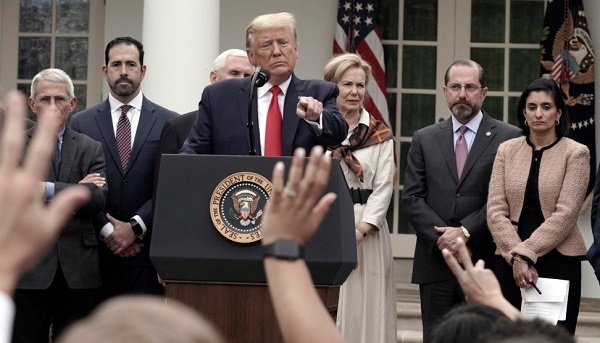Multi-billion COVID-19 aid package; Know 8 things US's 'Families First Coronavirus Response Act' includes provision for -
Total Views |
New York, March 19: Amid Corona virus chaos, the one sphere is fighting to, US President Donald Trump on Thursday declared to have signed into law a sweeping multi-billion emergency aid package to help Americans mitigate the adverse economic impact of the fast-spreading epidemic that has killed over 8,800 people, including nearly 150 in America.
The bill, called the Families First Coronavirus Response Act, includes provisions offering paid sick leave for impacted workers and free COVID-19 testing. It also boosts unemployment insurance, food assistance and federal funding for Medicaid as part of an ongoing effort by the US government to combat the rapid spread of the coronavirus pandemic.

"Today, I have signed into law H.R. 6201, the 'Families First Coronavirus Response Act' (the 'Act'). The Act makes emergency supplemental appropriations and other changes to law to help the Nation respond to the coronavirus outbreak," Trump said in a statement on Thursday. Passed by the House of Representatives 363-40 and Senate by 90-8 votes, the act is designed to bolster the federal government's response to the accelerating novel coronavirus (COVID-19) outbreak and address the impacts the virus is having on Americans' health and financial security. Here are 5 imporatnt aspects that the Act diligently caters to :
1. The act ensures that American families and businesses impacted by the virus receive the strong support they need.
2. According to the White House, the legislation provides strong economic assistance to American businesses, workers, and families, alleviating financial burdens experienced by those affected by the virus.
3. The act provides free coronavirus diagnostic testing for the American people, regardless of their economic circumstances or health coverage.
4. The act establishes tax credits to provide paid sick and family leave for coronavirus-related employment interruptions. This is also to build on the administration's longstanding commitment to take every step necessary to provide economic relief and support for Americans.
Today I joined @POTUS & @VP to give an update on the @DeptofDefense effort to support the administration's whole government approach. We will continue our support to combat #COVID19. pic.twitter.com/85aac4NxHv
— Archive: Dr. Mark T. Esper (@EsperDoD) March 18, 2020
5. Eligible workers who are sick with the virus, quarantined, taking care of someone affected or caring for a child whose school has closed, will continue to be paid. "Employees will receive pay directly from their employers, rather than from a less-efficient government-run programme", the White House said.
6. The act protects small businesses by offering an exemption in the rare event that paid leave requirements would jeopardise their business.
7. To support families and the most vulnerable, the bill also provides funding and flexibility for emergency nutritional aid for senior citizens, women, children, and low-income families.
8. The bill offers free coronavirus testing including free testing through commercial insurance, Medicare, Medicaid, CHIP, Indian Health Service, and TRI-CARE.
"This is a national emergency, not time for intra-party squabbling among Republicans. It is inexcusable that Congressional Republicans needlessly slow-walked this crucial assistance in the midst of a crisis while they debated amongst themselves," said US Senator Jack Reed in an interview to a private news channel.
STRONG & UNITED, WE WILL PREVAIL! pic.twitter.com/T6UCyaPRIy
— Donald J. Trump (@realDonaldTrump) March 18, 2020
"We need a second thing: we need what we call Employment Insurance. Right now, Unemployment Insurance is hard to get. You get paid only a fraction of what you'd have at work, and many people are not covered. We want to say anyone who loses his or her job because of this crisis will get paid fully by the federal government it's Employment Insurance, not Unemployment Insurance, and that will put money in the pockets of the people who need it most", he added.
US President Donald Trump, in a bid to contain the novel Corona virus, declared National Emergency last week.The United States now has at least 8,736 cases of the coronavirus and 149 deaths, as noted by the Centers for Disease Control and Prevention. New York is by far the worst-hit state, with more than 2,900 cases, while Washington is next, with 1,187 cases till date.

